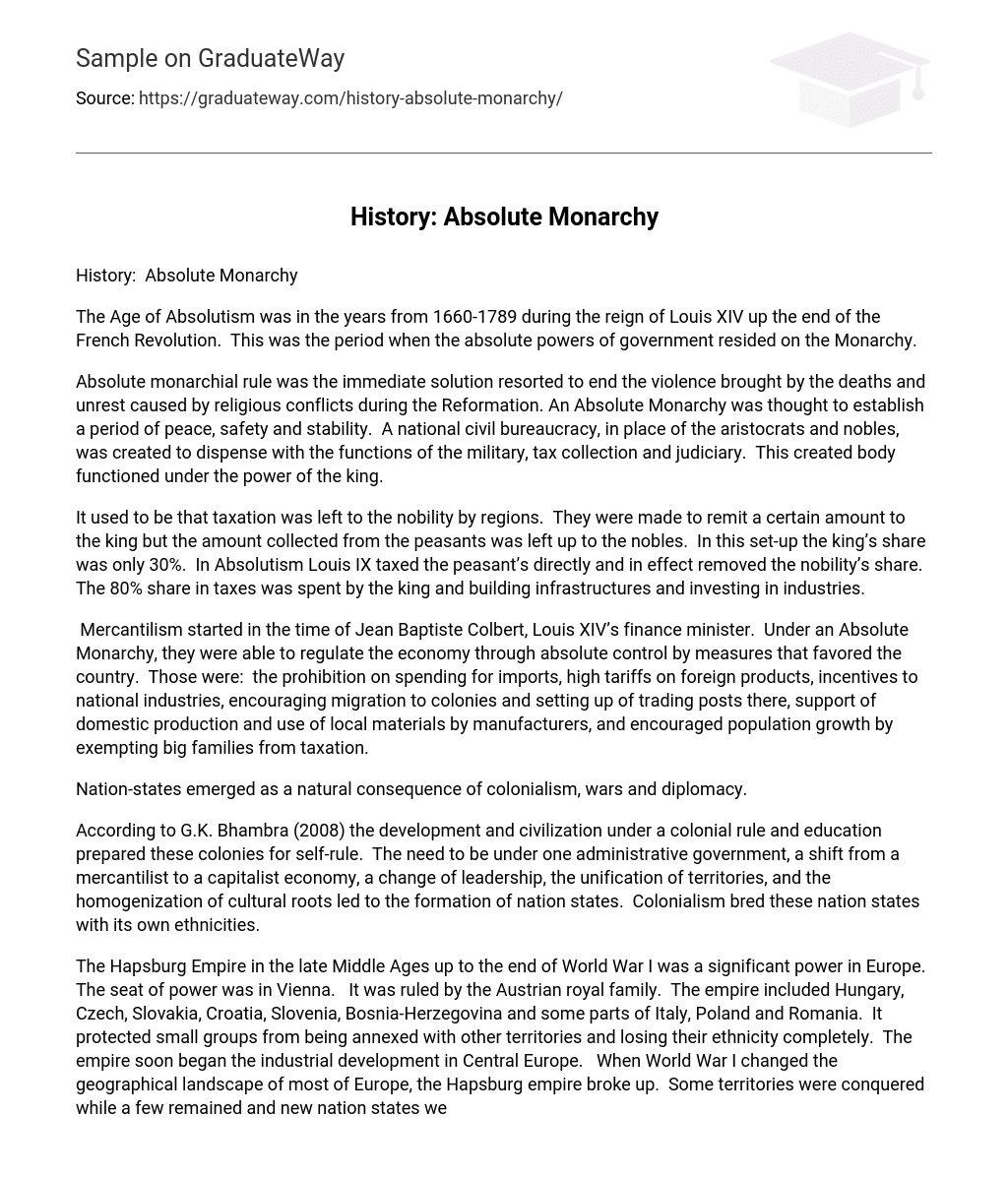The Age of Absolutism was in the years from 1660-1789 during the reign of Louis XIV up the end of the French Revolution. This was the period when the absolute powers of government resided on the Monarchy.
Absolute monarchial rule was the immediate solution resorted to end the violence brought by the deaths and unrest caused by religious conflicts during the Reformation. An Absolute Monarchy was thought to establish a period of peace, safety and stability. A national civil bureaucracy, in place of the aristocrats and nobles, was created to dispense with the functions of the military, tax collection and judiciary. This created body functioned under the power of the king.
It used to be that taxation was left to the nobility by regions. They were made to remit a certain amount to the king but the amount collected from the peasants was left up to the nobles. In this set-up the king’s share was only 30%. In Absolutism Louis IX taxed the peasant’s directly and in effect removed the nobility’s share. The 80% share in taxes was spent by the king and building infrastructures and investing in industries.
Mercantilism started in the time of Jean Baptiste Colbert, Louis XIV’s finance minister. Under an Absolute Monarchy, they were able to regulate the economy through absolute control by measures that favored the country. Those were: the prohibition on spending for imports, high tariffs on foreign products, incentives to national industries, encouraging migration to colonies and setting up of trading posts there, support of domestic production and use of local materials by manufacturers, and encouraged population growth by exempting big families from taxation.
Nation-states emerged as a natural consequence of colonialism, wars and diplomacy.
According to G.K. Bhambra (2008) the development and civilization under a colonial rule and education prepared these colonies for self-rule. The need to be under one administrative government, a shift from a mercantilist to a capitalist economy, a change of leadership, the unification of territories, and the homogenization of cultural roots led to the formation of nation states. Colonialism bred these nation states with its own ethnicities.
The Hapsburg Empire in the late Middle Ages up to the end of World War I was a significant power in Europe. The seat of power was in Vienna. It was ruled by the Austrian royal family. The empire included Hungary, Czech, Slovakia, Croatia, Slovenia, Bosnia-Herzegovina and some parts of Italy, Poland and Romania. It protected small groups from being annexed with other territories and losing their ethnicity completely. The empire soon began the industrial development in Central Europe. When World War I changed the geographical landscape of most of Europe, the Hapsburg empire broke up. Some territories were conquered while a few remained and new nation states were formed.
Peter I, the Tsar of Russia from 1682 to 1725 was a member of the Romanov royalty. He ruled a politically and culturally divided people, hostile against a different ethnic group. They were Indo-European mix and Peter I strove to adopt Western ways in politics, culture and industries. He created a standing army from 5% of the whole male population. He acquired the Baltic Sea from Sweden where in he established the seat of power in St. Petersburg.
Nation States were formed because of the belief that each nation must have its own state. It started in Europe in the 19th century. Before then, Britain, France and Spain were already existing monarchies and powerful nations, while Germany and Italy gained their independence much later in the mid-1800s. Owing to large and multinational empires it took time before independent nations followed.
Mikhail Gorbachev’s unique reform program and openness policy set an example to the rest of Europe that in a way contributed to the break-up of the Soviet Union peacefully. It may have been a diplomatic way to an extent of breaking an empire to make way for nation states.
Works Cited
Bhambra, Gurminder. “Modernity and Globalization.” 2008. University of Warwick,
Canada. 25 July 2009 http://www2.warwick.ac.uk
Gerhard, Remphel. “Mercatilism.” 2009. Western New England College. 25 July 2009
http://mars.wnec.edu/~grempel/courses/wc2/lectures/mercantilism.html
Hooker, Richard. “The Age of Absolutism.” June 6, 1999. World Civilizations.
25 July 2009 http://www.wsu.edu/~dee/ENLIGHT/PRE.HTM
Wheeling Jesuit University. “The Balkans.” 2002. Center of Educational Technologies.
25 July 2009 http://www.cotf.edu/earthinfo/balkans/BKdef.html





